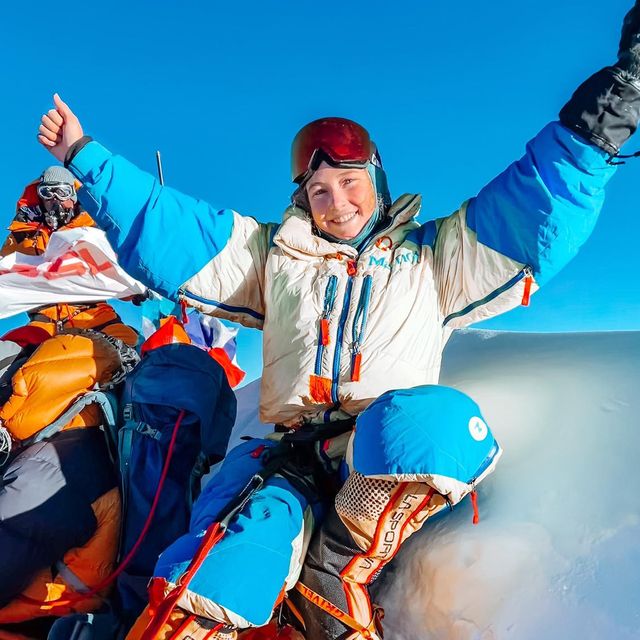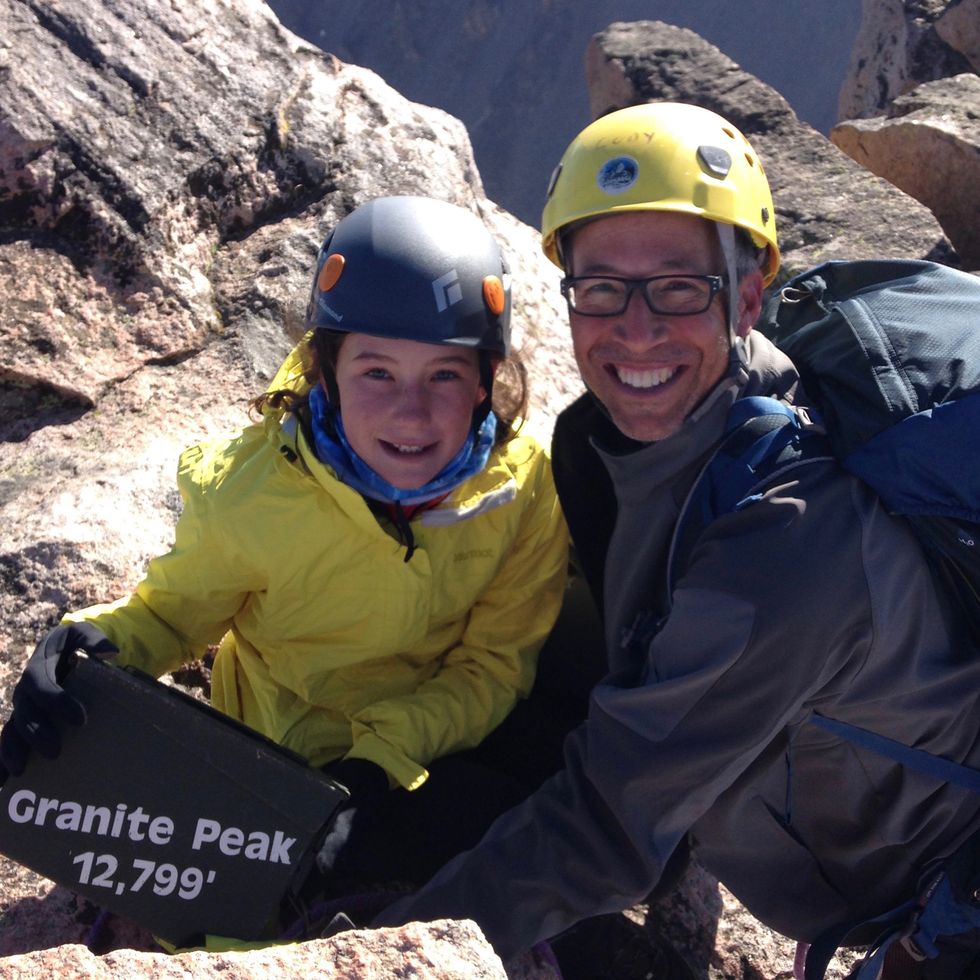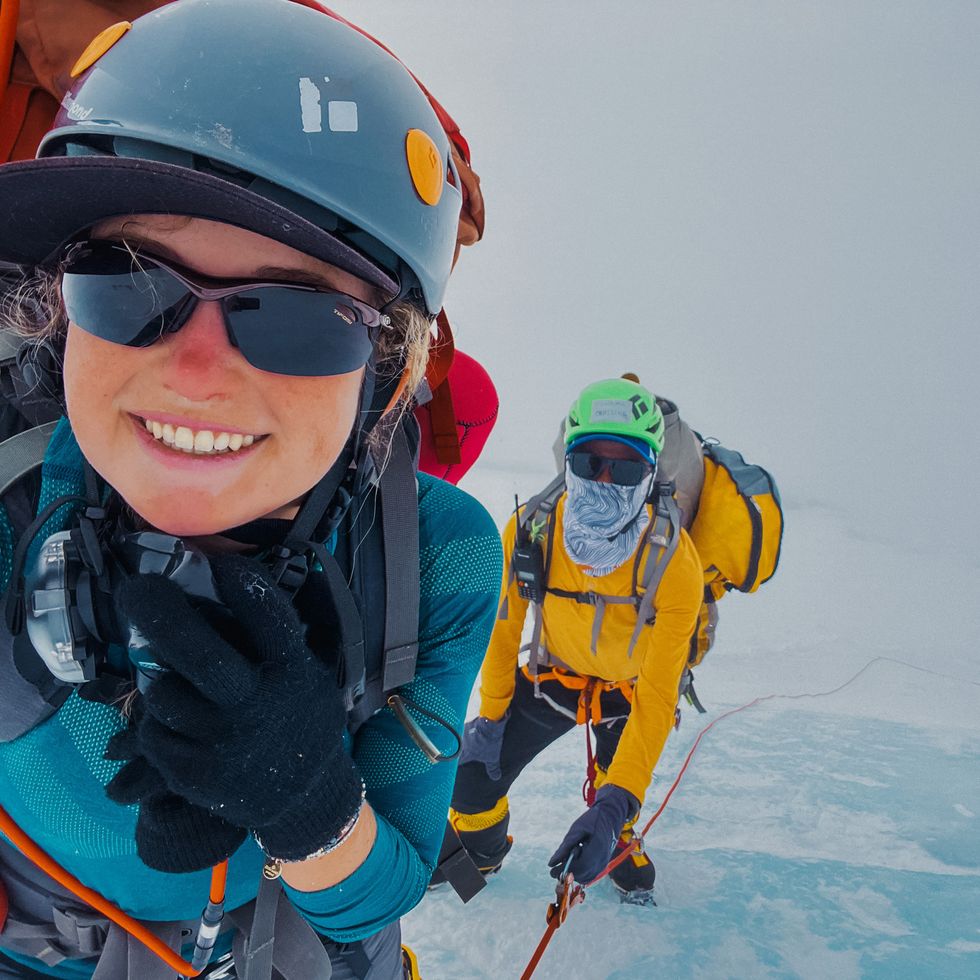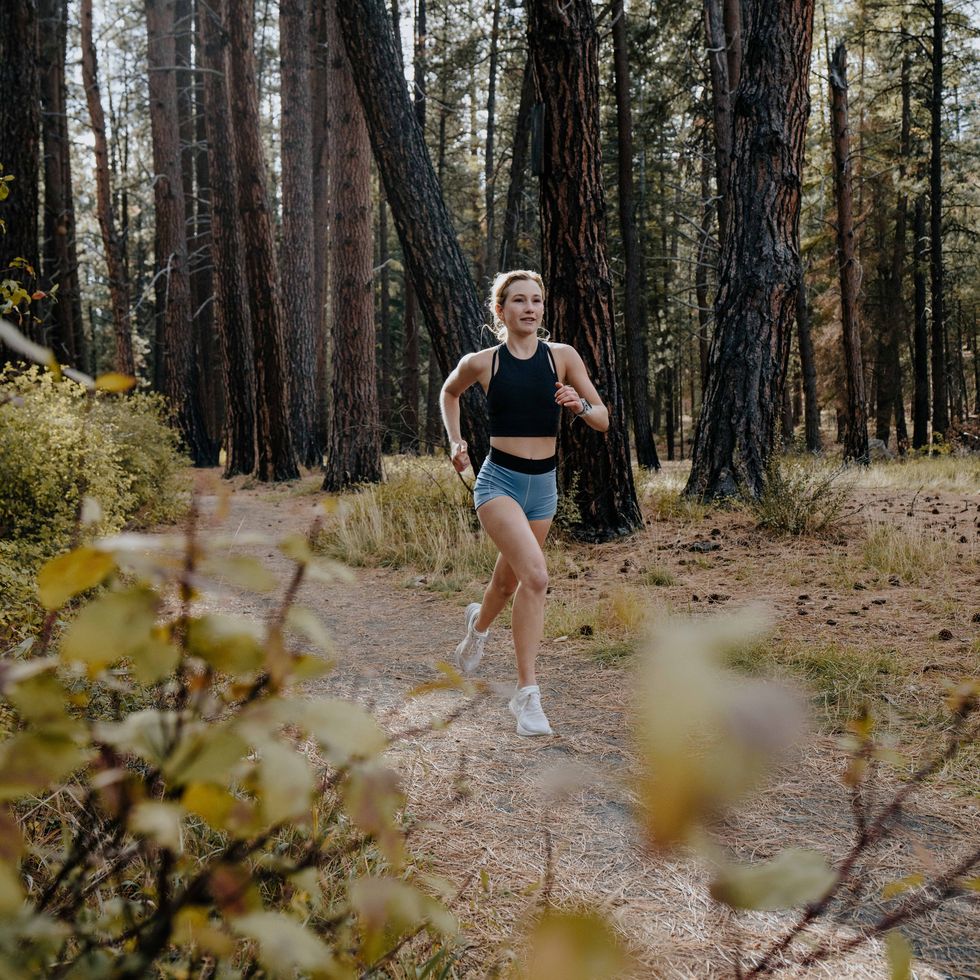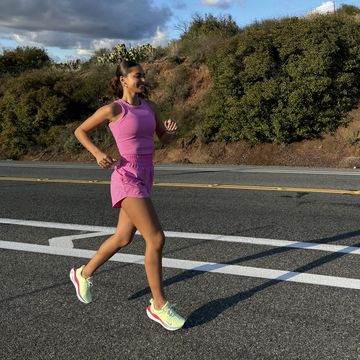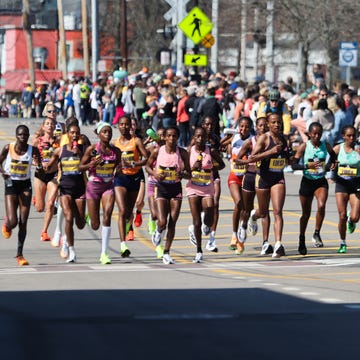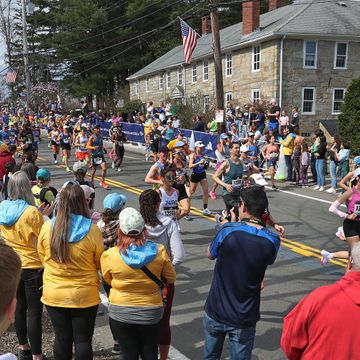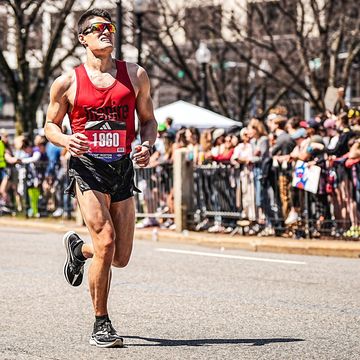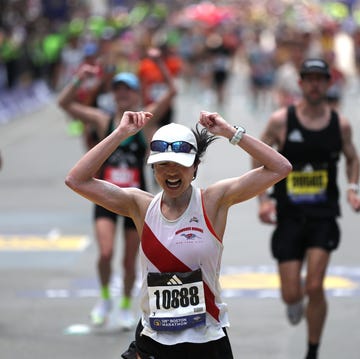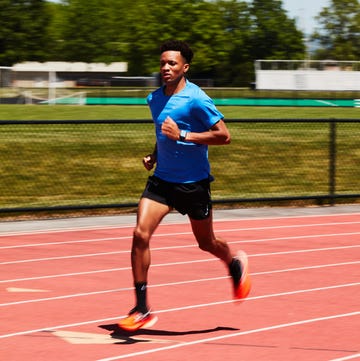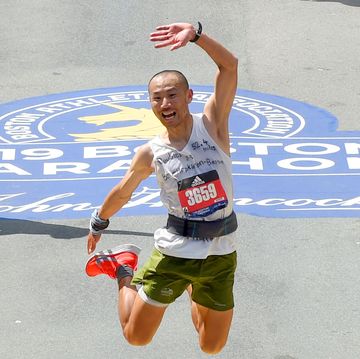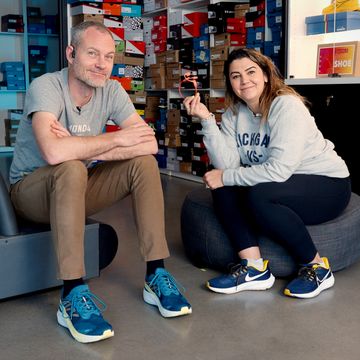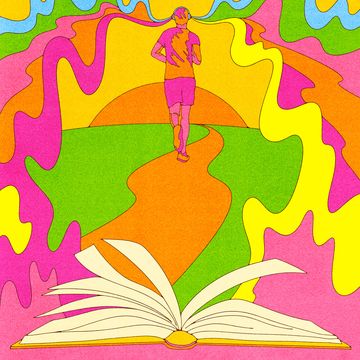After running year-round for 11 years, Lucy Westlake recently joined the track and cross-country team at the University of Southern California in Los Angeles.
In high school, she ran the 5K cross-country event and 3200-meter track distance with a few career highlights including becoming the Illinois State Team Champion in 2018 and 2019. Now, she’ll compete in the 6K cross-country event and 5,000-meter and 10,000-meter track distances.
While the direction of her adult running career has yet to unfold, Westlake, 18, tells Runner’s World that her lifelong athleticism as a runner has already helped her reach tremendous heights.
In fact, on May 12, 2022, the Chicagoan became the youngest American woman to summit Everest, the world’s highest peak at 29,032 feet, right before her high school graduation. (Westlake was 18 years, 6 months, and 8 days old, beating out the last record holder who was 18 years, 7 months, and 9 days old.)
Climbing Everest took 27 days, and every single step was worth it, says Westlake.
“It was definitely the hardest thing I’ve ever done in my life—physically, mentally, and emotionally. Looking up at the summit from Camp 4 the day before our summit push, it truly looked impossible. At 9:00 p.m., my Sherpa and I began our climb and 8.5 hours later we stood on top of the world together,” she says.
A Start in Two Sports
Raised in Louisville, Kentucky, Westlake started running with a team at age 6. In January 2016, during 6th grade, her family relocated to Naperville, Illinois, a western suburb of Chicago.
While attending Naperville North High School, Westlake’s weekly training routine included one 90-minute long run, three to four strategic workout runs, like tempo workouts, which totaled six to eight miles each, and easy runs in between. She also made sure to have a complete rest day every two weeks, while hitting a weekly mileage of 40.
Core workouts and yoga were also a big part of Westlake’s high school routine, as well as weight training for 50 minutes, four to five days a week.
Despite growing up in cityscapes, her first-ever run was on trails—not pavement—near her family’s cabin in the Upper Peninsula of Michigan, when her grandpa challenged her to a dual to see who could first reach the top of a nearby slope.
“I love trail running and want to explore that more after college. You get to see beautiful scenery and it’s challenging,” says Westlake, who also took a roadtrip to the Grand Canyon with three teammates this summer to run and hike the 24-mile Rim-to-Rim, which is the furthest distance she’s covered on a run in one effort.
Prior to setting the world record on Everest, Westlake became the youngest female, at age 17, to climb the highest peaks in all 50 states. She and her dad, Rodney Westlake, completed the goal together over the course of a decade. That journey included a 21-day summer expedition to the summit of Denali, in Alaska, which was the most challenging summit to reach in the U.S., she says, due to the required mountaineering skills, weather window, risk management, and time commitment.
“I was always running on a team and in school, so my family did one or two short road trips out west to climb mountains every year,” says Westlake, who was first introduced to high altitude while visiting family in the city of Puebla, Mexico, at age 6, when she hiked the 14,636-foot La Malinche.
Climbing Everest
On April 15, 2022, Westlake, her dad, and seven friends flew to Kathmandu, Nepal, where they met their guides to trek to South Everest Basecamp. Two days later, they flew to Lukla, where they started the eight-day, 38.5-mile trek to basecamp, camping overnight at tea houses along the way.
South Everest Basecamp is a collection of primitive campsites at the base of Everest, where mountaineers stage their ascent and descent of a climb up the southeast ridge. Westlake’s dad and their seven friends stayed one night at basecamp before returning to Lukla the same way they’d hiked in, and they all flew back to the United States. They did not continue with Westlake up Everest, which she ascended with her Sherpa guide for the next 16 days.
On the day of Westlake’s summit, prosperous conditions quickly aligned: As mentioned, the out-and-back took Westlake 27 days (a climb that takes 40 days, on average, to complete).
“We got lucky with the first good weather window of the year, and I was one of the first people to summit,” Westlake says. “I didn’t have any unusual problems with how my body reacted to the altitude, so I didn’t need very many rest days. My Sherpa and I moved well together and had a great chemistry, so the climb was perfect.”
To help cover the cost of her climb, Westlake received a $12,500 scholarship from Grape-Nuts, the breakfast cereal brand. In March 2022, the brand donated a total of $115,000 to 10 female adventurers pursing expeditions to celebrate Women’s History Month.
How Running and Mountaineering Go Hand-in-Hand
Westlake credits her mountaineering fitness and endurance to her lifelong running routine.
“Running is a super cardio sport. In mountaineering, your heart rate at high elevation is naturally higher, and you’re climbing for hours on end. Running is a great way to train,” Westlake says.
It’s not just the physical aspect of running and mountaineering that make them complementary sports for Westlake.
“Running has taught me a lot about mental toughness—that’s the reason I’m able to summit mountains,” she says. “I’ve become used to accepting pain. You have to be able to push your body and stay focused.” Summit day on Everest was long, she adds, so being able to work through the physical and mental hardships is a crucial skill, which running helps her hone.
In fact, Westlake says the skills she gained on the run, particularly not so good runs, helped her make it to the top of Everest. “I’ve had great races and bad races, great seasons and bad seasons. I’ve learned along the way that patience, consistency, and believing in yourself lead to long-term success—it’s the same on a high-altitude mountain. It takes patience to allow your body to acclimate, consistency of putting one foot in front of the other no matter how hard it gets, and always believing that it’s possible,” she says.
Learning to take the rough patches as they come and continue moving forward also carries from her mountaineering adventures back to her run miles. “During tough running workouts when I was struggling and felt like finishing was impossible, I remember back to when I was climbing fixed ropes up vertical walls in the Khumbu Icefall on Everest and had no idea how I was going to reach the top. And when my wake-up call to start a summit push is at 4:00 a.m. and I am completely exhausted from not being able to sleep well at high altitude, I remember back to all those early morning running practices, and it feels like second nature.”
Westlake’s Future Goals
Westlake’s new goal? Become the youngest person, male or female, in the world to complete the Explorers Grand Slam within the next two years. This challenge includes reaching the North Pole and South Pole and summiting the Seven Summits—the highest peaks on each of the seven continents.
“My mountaineering goals are driven to help close the gender gap in the mountains. If an 18-year-old, 5’4” 105-pound girl can climb Mount Everest, so can a lot of other women,” says Westlake. “I want the next generation of girls to see mountaineering as a sport they can pursue and strive to become the best they can be.”
In addition to her climbing goals, Westlake also has her sights set on running victories. “I want to see how far I go in college and if I can pursue a running career, especially in distance running,” she says. “I’d love to try a marathon after college, because endurance is my strong suit. My strongest aspect is my mental toughness, which marathons lend themselves toward.”
Climbing to Support Human Health and Female Athletes
Westlake uses her expeditions to raise awareness and funds through LucyClimbs, an Etsy shop with merchandise like sweatshirts and t-shirts, to support WaterStep, a nonprofit that teaches water treatment practices and provides filtration resources to communities in need worldwide.
“I love the mountains and running for myself but need to have that higher purpose. I don’t want my gifts to be selfish, I want to give back,” she says.
Westlake also received the 2022 Billie Jean King Youth Leadership Award at the annual ESPY Awards, thanks to her summit of Everest. The award is categorized as an ESPN Sports Humanitarian Award, and was designated to five women for using their athleticism for a positive influence on society.
“Mountaineering is a sport dominated by men twice my age and size. When I’m in the mountains, I don’t see many people like myself. The mountains have shaped me into the person I am today—so has running—and together they give me purpose,” Westlake says. “My Everest climb was dedicated to promoting women in the outdoors and inspiring girls to follow their dreams not only in mountains but in any sport and aspect of life. There’s a huge gender gap in mountaineering, and the best way to combat that reality and stereotype is to see other women in mountains and eliminate the cost barrier.”
Morgan Tilton writes about the outdoors with a focus on travel, industry news, and human endurance. Her work is featured in more than 70 publications, and she’s a recipient of many North American Travel Journalists Association awards, including double-awards for the essays, “Wild & Broken: A First SUP Descent of Utah’s Escalante River” and “A Wild Space.” Morgan grew up mountain biking, hiking, and playing in Colorado’s San Juan Mountains before moving to Crested Butte, in the adjacent range.
